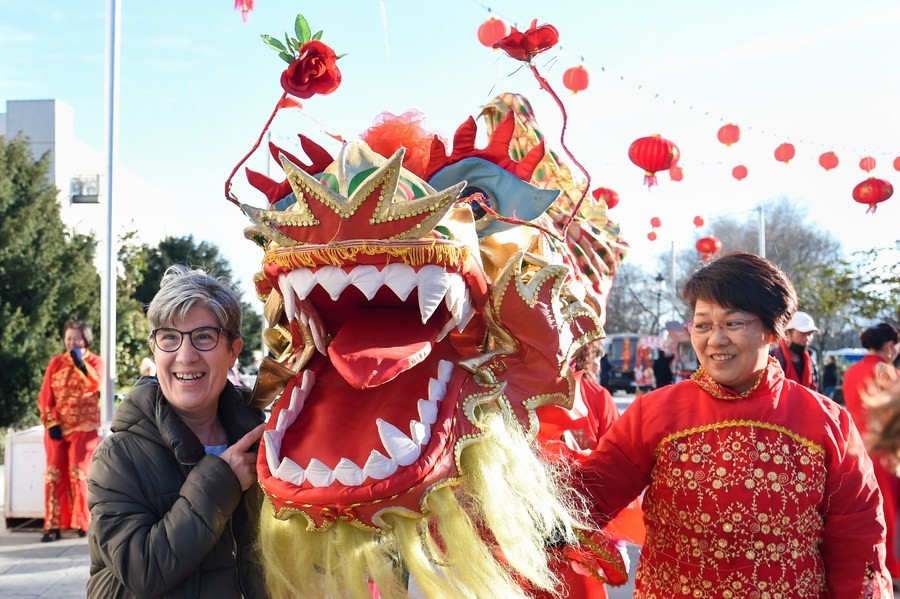
Volunteers are cleaning the water surface in Changgang Village under Changxing County of Huzhou City, east China's Zhejiang Province, June 5, 2023. [Photo/Xinhua]
By Ni Feng
The Global Civilization Initiative (GCI) was put forward by Chinese President Xi Jinping at the Communist Party of China in Dialogue with World Political Parties High-level Meeting in Beijing, China, on March 15, 2023. President Xi said, "As the future of all countries is closely connected, tolerance, coexistence, exchanges, and mutual learning among different civilizations play an irreplaceable role in advancing humanity's modernization process and making the garden of world civilizations flourish."
As he pointed out, various forms of civilization always develop through interactions with others. Only through mutual recognition, complementarity, and referencing different civilizations can human civilization progress. Respecting the civilizations of different nations is essential to preserve the diversity of world civilizations. This diversity, in turn, facilitates equal dialogue among different civilizations. Strengthening dialogue on an equal basis enhances mutual understanding and tolerance, thereby guiding the world toward peace. A peaceful world allows for mutual learning and adaptation among different civilizations, which helps to overcome cultural nihilism and rationally view the cultural traditions of civilizations in various forms and systems.
Following the Age of Enlightenment, the establishment and consolidation of a simplistic binary framework has hindered equal exchanges and cooperation among the civilizations of different nations. This Eurocentric, and later, American-centric, worldview equates human progress with West-dominated modernity, thus providing an ideological foundation for the economic, political, and military expansion of Western capitalism.
Modernity carries inherent tensions. As nations develop economically, politically, and socially, they inevitably seek to develop their cultures. The powerful internal forces of different civilizations strive to break away from the singular and exclusive binary narrative that centers on Western superiority. Modernity today is not only pluralist but also diverse. This multiplicity makes it a common need for the progress of civilization to transcend West-dominated cultural barriers and engage in equal and mutually respectful civilizational exchanges.
We should base our approach on the diversity of civilizations and promote the common development of human society in the spirit of equality, openness, inclusiveness, and win-win cooperation through strengthened civilizational exchanges and mutual learning. In this context, it is essential to address two questions.
The first is, what to make of the achievements of China's development.
It should not be interpreted from the sole perspective of economic growth. Understanding China's development requires breaking free from the binary framework that contrasts the "universal (Western) vs. particular (Chinese)" or "modern (Western) vs. traditional (Chinese)." Rooted in a civilization spanning thousands of years and adhering to historical materialism, China's revolutionary path and socialist development have, in less than a century, broken the binary shackles. They exhibit a high degree of openness and inclusiveness, absorbing the fine achievements of other civilizations in the world, including Western civilization. China's revolution and development have changed the destiny of more than a billion Chinese people.
Therefore, China's development is not a formal and quantitative catching up with the West; rather, it encompasses political, social, and cultural domains beyond the economic realm, blazing a trail of modernity different from the West in practice. This demonstrates that modernity is both pluralist and diverse, making a significant contribution to the progress of human civilization.

A resident poses for a photo with a lion dancer during an event to celebrate the Chinese New Year in Madrid, Spain, January 20, 2023. [Photo/Xinhua]
The second is how to deal with the differences in the outlook on civilization with the West.
The West, represented by the U.S. and Europe, has gradually realized that despite its high degree of openness and inclusiveness, Chinese civilization shows a tendency to be insulated from the Western binary conceptual system and lacks the motivation to change that West-centric system. We should go beyond the binary framework and form a consensus on pluralist and diverse modernity through mutual learning. Based on this consensus, the world should not be unipolar or multipolar, nor should it be in a state of "clash of civilizations" as American political scientist Samuel Huntington suggested. Instead, we should build a new world order with an open and inclusive mindset while transcending existing cultures and building new ones based on open modernity.
In the era of globalization, cultural exchanges between nations, states, and regions are becoming increasingly frequent, making the world an inseparable whole. Cultures, instead of being homogenized, are achieving integration and innovation. The transmission of indigenous civilizations and the diverse social forces of various countries are playing an increasingly important role in cultural development. The multiplicity of modernities in the cultural sense is becoming a profound connotation of globalization, conducive to building a pluralist, cooperative, and responsible global social order and governance structure.
Mutual learning among civilizations is not just about overcoming geographical or spatial barriers to dialogue. It also transcends existing cultures, no matter how great they may have been in the past or are at present. The greater a culture, the more it tends to maintain a sense of superiority and discriminate against other cultures. However, it is only by acknowledging and protecting cultural differences that civilizations can learn from each other, discover more about themselves, and develop further.
Ni Feng, a special commentator for CGTN, is the Director of the Institute of American Studies at the Chinese Academy of Social Sciences.

 中文
中文



